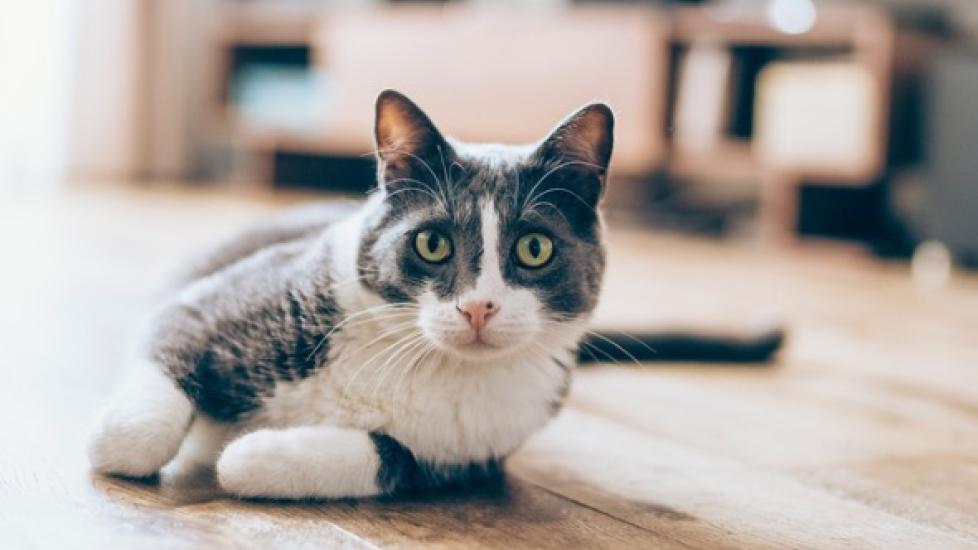Stomatitis in Cats
What Is Stomatitis in Cats?
Stomatitis in cats is a complex, painful, and frustrating disease that causes severe inflammation of the entire mouth, including the gingiva (gum tissue around the teeth) and mucous membranes.
Feline stomatitis [often called feline chronic gingivo-stomatitis (FCGS) by veterinary dentists] affects up to 10% of cats.
Health Tools
Not sure whether to see a vet?
Symptoms of Stomatitis in Cats
The first symptom of feline stomatitis you may notice is a foul odor coming from your cat’s mouth. This may be accompanied by excessive salivation/drooling, or you may notice that your cat is not grooming themselves as much.
You might also see your cat dropping food from their mouth or crying out while eating. Some cats become so painful they become hesitant to eat and may avoid food to the point that they start losing weight.
Causes of Stomatitis in Cats
The cause of stomatitis in cats is unknown. Veterinarians do know that there is an abnormal immune system response that leads to stomatitis. It’s most likely an exaggerated response to bacteria and plaque on the teeth, but the exact cause of that response remains a mystery.
How Vets Diagnose Feline Stomatitis
Veterinarians diagnose stomatitis in cats primarily by doing a thorough oral examination.
Severe inflammation of the gums (gingiva) along with severe inflammation of the inside of the cheeks (buccal mucosa) and the back of the mouth (caudal oropharynx) is usually diagnostic for stomatitis.
Many patients also experience tooth resorption and inflammation of the bone around the teeth (periodontitis) at the same time.
Treatment for Stomatitis in Cats
Successful treatment of feline stomatitis requires minimizing bacteria in the cat’s mouth as much as possible. This is rarely achieved through at-home dental care or anesthetized cleanings alone, as even a small amount of bacteria or plaque can be seen in cats with severe stomatitis.
In fact, cats with stomatitis often have severe inflammation that does not resolve or quickly returns after a thorough dental cleaning by their veterinarian. The current recommended treatment is partial or full-mouth tooth extraction surgery.
While this may seem to be a drastic measure, it is currently the best way to achieve substantial and long-term comfort for affected cats. This can be an extensive surgery, and your veterinarian may recommend a consultation with or referral to an American Veterinary Dental College specialist (aka, a veterinary dentist).
Recovery and Management of Feline Stomatitis
Studies have shown that 90% of cats that undergo partial or full-mouth tooth extractions have shown complete resolution of their symptoms.
For cats that eat hard kibble, they should be transitioned to canned food before surgery with a plan to remain on a softened diet for at least two to three weeks after tooth extractions.
For cats that are hesitant to eat during the first few days after surgery, your veterinarian can prescribe an appetite stimulant. Your veterinarian will also provide medications for you to take home for post-surgical pain and inflammation.
Once the gum tissue has healed, many cats are willing and able to eat kibble again. And cat owners often see a quick improvement in their cat’s attitude, appetite, and quality of life once their mouth is free from the pain and inflammation of stomatitis.
Stomatitis in Cats FAQs
Is stomatitis in cats curable?
Feline stomatitis is curable in the sense that surgical removal of teeth and affected bone can lead to complete resolution of the pain and inflammation in the mouth, but there are no other medications or treatments that offer a true cure for this disease.
How long can a cat live with stomatitis?
Cats affected by stomatitis can live with the disease for many years, but their quality of life can be severely affected. The relentless pain caused by stomatitis can cause a change in everything from your cat’s demeanor to an unwillingness to eat leading to drastic weight loss. Cats given the proper care for stomatitis through partial to full-mouth tooth extractions live the happier, healthier, pain-free lives they deserve.
What can I do if my cat has stomatitis?
If your cat has been diagnosed with stomatitis, work with your veterinarian to develop a plan for when and how your cat can receive the necessary tooth extractions. As in humans, extensive dental surgery in pets can be expensive, so make sure your plan includes an estimate of costs so that you are prepared to budget accordingly.
Why do cats get stomatitis?
Unfortunately, we do not know why cats get stomatitis. There is no current evidence that supports a specific cause. We only know that it is an abnormal response of the immune system.
Is stomatitis contagious in cats?
No. Stomatitis is an abnormal over-response of the individual cat’s immune system and is, therefore, not contagious.
References
-
Lommer MJ. Efficacy of cyclosporine for chronic, refractory stomatitis in cats: a randomized, placebo-controlled, double-blinded clinical study. J Vet Dent. 2013; 30(1):8-17.
-
Hennet P. Feline chronic gingivostomatitis: Extraction and what else? Veterinary Dental Forum. 2010.
-
Hennet P. Chronic gingiva-stomatitis in cats: Long-term follow-up of 30 cases treated by dental extractions. J Vet Dent. 1997;14(1):15-21.
Help us make PetMD better
Was this article helpful?
